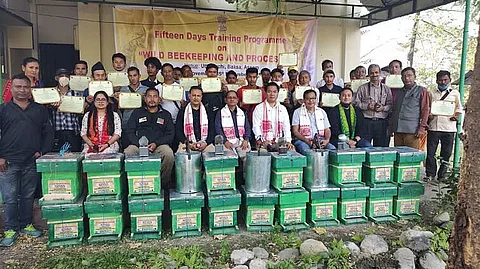
- Home
- Live Blog
- Breaking News
- Top Headlines
- Cities
- NE News
- Sentinel Media
- Sports
- Education
- Jobs

A CORRESPONDENT
BAKSA: A 15-day training programme on 'Wild Bee Keeping and Processing' was organized recently by Assam Science Technology and Environment Council (ASTEC) in Uttarkuchi village, which is on the fringes of Subonkhata Reserve forest under Manas Tiger Reserve.
This programme was part of the climate resilient activity of a programme entitled 'Designing Climate Resilient Practices to Strengthen Management of Kaziranga and Manas Landscape' sponsored by State Innovation and Transformation Aayog, Government of Assam. Green Environment Task Force worked as a technical collaborator of ASTEC while Manas Sousi Khankar Ecotourism Society and Manas Chouki Echo Tourism Society worked as associates for successful implementation of the programme.
Due to continuous forest destruction and developmental activities, there is significant rise of green house gases like carbon dioxide, nitrogen oxide etc. which affect the atmosphere.
It has resulted in severe climate change related hazards like excessive rain, flush flood, draught and water scarcity, rise of temperature, habitat change, human wildlife conflict and less production of crops. Manas landscape located in the Indo-Bhutan border area and adorned as a part of a world heritage site, a national park, a biosphere reserve and a tiger reserve has been badly affected by severe climate change related hazard like water scarcity, flush flood and human-animal conflict problem, especially human-elephant conflict in fringe areas.
Several villagers of the area depend on the forest resources of Manas landscape for their livelihood. But the excessive pressure on the forest resources resulted in degradation of forest that accelerated the climate change scenario in the landscape.
Therefore, ASTEC decided to promote sustainable use of non-timber forest products through climate-friendly livelihood options like wild beekeeping and processing in the areas like Uttarkuchi. This area was badly affected by climate change-related hazard like water scarcity and human elephant conflict. However, the villagers gradually have been involved in the restoration of forest with support of local NGOs.
During this 15-day programme, more than 20 participants could learn different aspects of beekeeping like identification of bees, important food plants, catching, transferring of bee colonies from wild and traditional boxes to scientific boxes, processing honey and bottling and labeling to marketing opportunity through theory and practical classes.
Apart from beekeeping, the participants, got knowledge of environment, forest restoration, activities of Jal Mission, management of plastic waste and importance of snake conservation.
An exposure visit was organized for the participants to the bee village Barbari and honey processing unit of Green Environment Task Force, a NGO and technical collaborator of this training programme. Earlier, during the inauguration function, Utpal Das and Samiron Kalita from ENVIS hub, ASTEC encouraged the participants to come forward for green skill development programme of ASTEC.
During the closing ceremony, Dr. Pranjal Bezbarua gave a short lecture on climate resilient projects in Manas and Kaziranga landscape and opportunity for local community in climate-friendly livelihoods as well as forest restoration in the area.
He also thanked the different local NGOs, namely Manas Sousi Ecotourism Society, Manas Chouki Ecotourism Society, Manas Daragaon Ecotourism Society and local communities for restoring Subonkhata reserve forest under Manas landscape.
The meeting ended with distribution of certificate, training guidebook, bee box and related instruments of beekeeping and processing to the participants.
Also Watch: